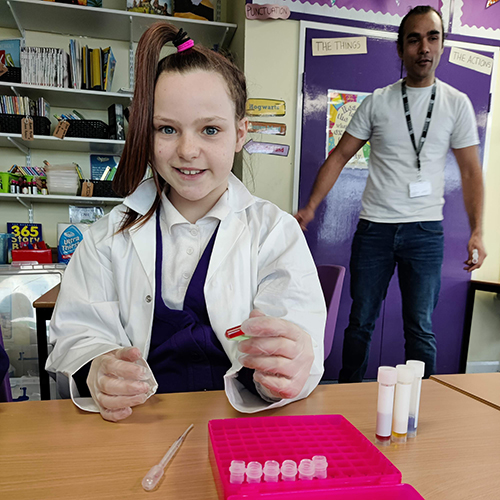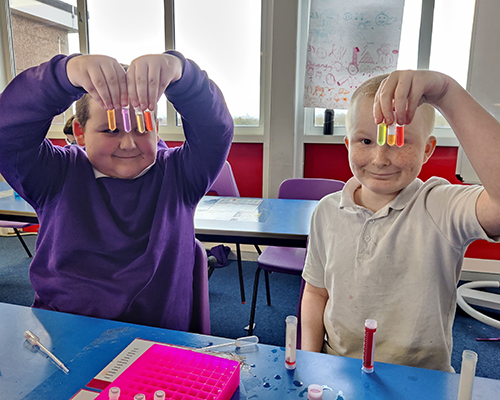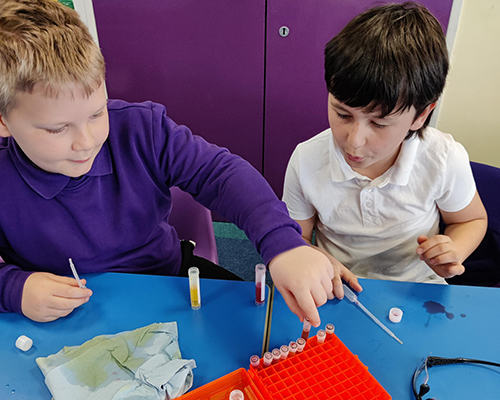
Pupil at Four Acres Academy learning about how PCR testing works to diagnose for COVID-19
Four Acres Academy

Pupils at Four Acres Academy learning about PCR testing
Four Acres Academy

Pupils at Four Acres Academy mimicking PCR testing
Four Acres Academy
Press release issued:
26 March 2021
Pupils at a Bristol school became scientists for a day to understand more about how PCR testing works to diagnose for COVID-19. Four Acres Academy is one of many local schools that are taking part in a ground-breaking University of Bristol research project to increase researchers understanding of infection patterns of COVID-19 in children.
The project, COVID-19 Mapping and Mitigation in Schools (CoMMinS), began last autumn with saliva-testing several thousand pupils and staff from schools across the city over the course of the school year. Once the researchers have collected the saliva samples, they are taken away to be analysed in a University lab to check for current or previous COVID -19 infection.
This week [25 March] Year 6 pupils at Four Acres Academy had the opportunity to put on lab coats and PPE and mimic one of the processes that is done to their samples when they arrive at the lab. The pupils collected precise quantities of dyed water samples and blend them together using pipettes. This will help the pupils to understand what the research team do with their saliva samples, how the testing is done and to learn more about the pooled PCR testing process. The hands-on science lesson has been possible thanks to a National Grid Hinkley STEM Project Grant.
Guillaume Livera, Senior Research Fieldworker in the CoMMinS study team at the University of Bristol, who will be running the hands-on science lesson, said: "We are delighted to be able to work with the school to engage young children in science and for them to understand what happens to their saliva sample once it has left the school. By taking part in CoMMinS they are learning more about COVID-19 and how to prevent the spread of the disease.
"We also explained to the pupils the different members of the team who work in the lab and those delivering the study so they could understand all the different roles and skill sets needed to run a research trial and all the different educational pathways that can lead to working in research."
Matt Cave, Headteacher at Four Acres Academy, added: "Being part of the CoMMinS project has helped in the safe return of children. Our pupils have been looking forward to this for many weeks and it’s a great opportunity for them to experience hands-on science not available in the classroom and discover science from real scientists."
The aim of CoMMinS is for researchers to understand patterns of infections, the role of symptoms in identifying infection and the longer-term impacts of COVID-19 in children. The study also aims to provide school heads with the tools to identify cases early so they can keep their schools open and allow the continuity of education.
'COVID-19 Mapping and Mitigation in Schools (CoMMinS)' is a 12-month NIHR-UKRI-funded study that will run until 31 July 2021.
If you are a local Bristol school and wish to participate in the study, please email: commins-study@bristol.ac.uk
Further information
About the National Institute for Health Research
The National Institute for Health Research (NIHR) is the nation's largest funder of health and care research. The NIHR:
- funds, supports and delivers high quality research that benefits the NHS, public health and social care
- engages and involves patients, carers and the public in order to improve the reach, quality and impact of research
- attracts, trains and supports the best researchers to tackle the complex health and care challenges of the future
- invests in world-class infrastructure and a skilled delivery workforce to translate discoveries into improved treatments and services
- partners with other public funders, charities and industry to maximise the value of research to patients and the economy.
The NIHR was established in 2006 to improve the health and wealth of the nation through research, and is funded by the Department of Health and Social Care. In addition to its national role, the NIHR supports applied health research for the direct and primary benefit of people in low- and middle-income countries, using UK aid from the UK government.
About UK Research and Innovation
UK Research and Innovation is the largest public funder of research and development in the UK. We are composed of seven research councils, Innovate UK and Research England.
Our work spans multiple research disciplines – medical, economic, social, arts, humanities, biological, environmental and global – as well as helping innovative businesses survive and thrive through these tough times. We've supported the people and projects behind major breakthroughs, including the Oxford University and AstraZeneca vaccine and the first treatments for COVID. We’re also a key contributor to the transformation of vaccine manufacturing in the UK.
About the Bristol UNCOVER group
In response to the COVID-19 crisis, researchers at the University of Bristol formed the Bristol COVID Emergency Research (UNCOVER) Group to pool resources, capacities, and research efforts to combat this infection.
Bristol UNCOVER includes clinicians, immunologists, virologists, synthetic biologists, aerosol scientists, epidemiologists and mathematical modellers and has links to behavioural and social scientists, ethicists and lawyers and is supported by a large number of junior academic and administrative colleagues.
Follow Bristol UNCOVER on Twitter at: https://twitter.com/BristolUncover
For more information about the University of Bristol’s coronavirus (COVID-19) research priorities visit: www.bristol.ac.uk/research/impact/coronavirus/research-priorities/
Support our COVID-19 research
Bristol's researchers are part of a global network of scientists responding urgently to the challenge of the coronavirus pandemic.
Find out how you can support their critical work.


